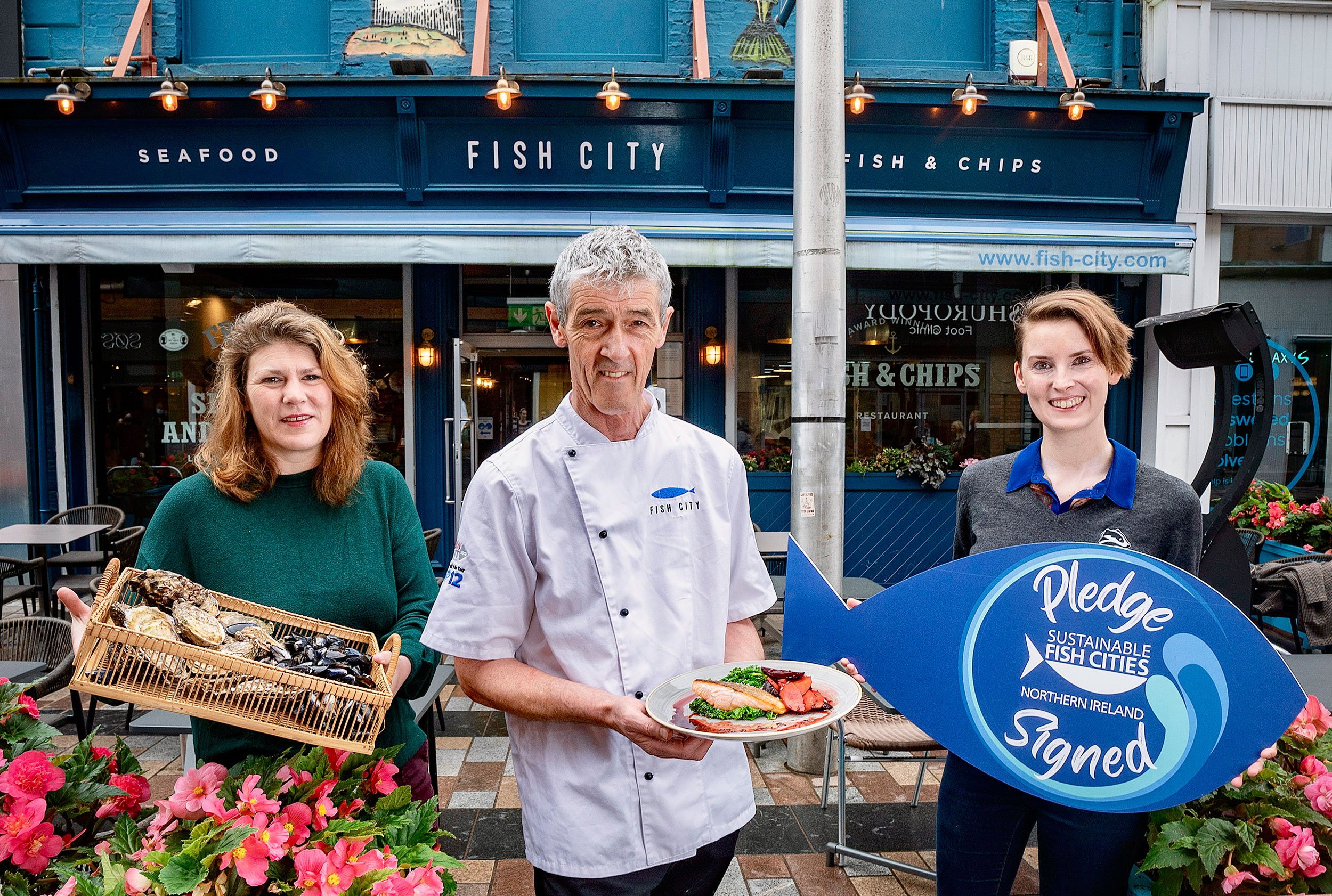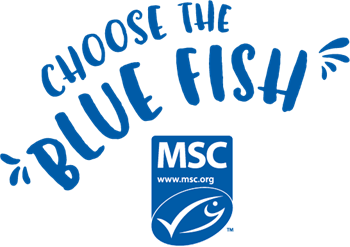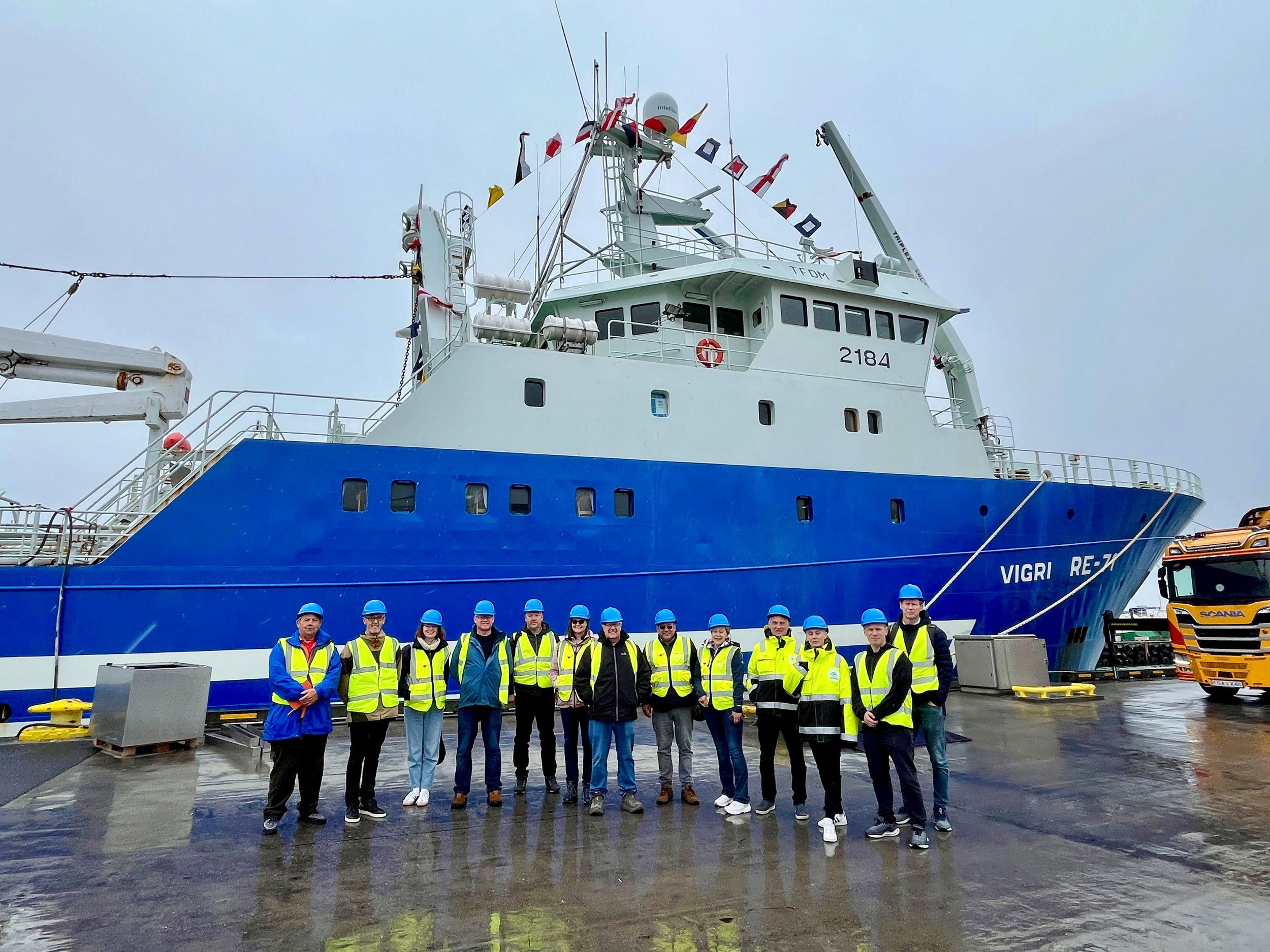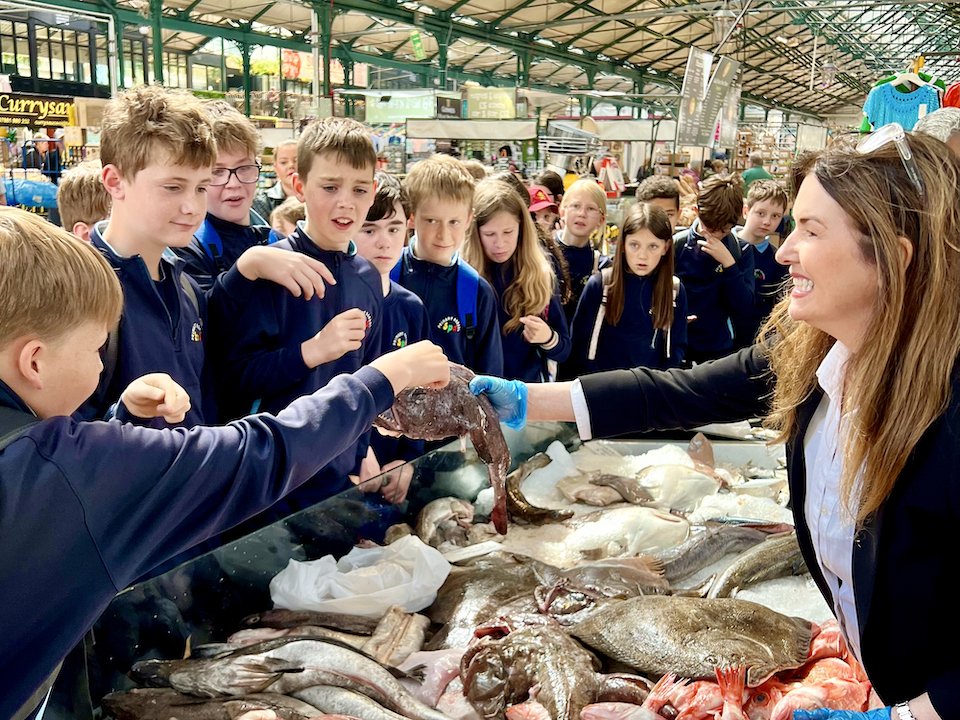Belfast Restaurant Week | Fish City Interview
Ahead of Belfast Restaurant Week 2024, Fish City was interviewed by the News Letter about sustainability and how the Belfast seafood restaurant is embracing eco-friendly practices.
As the first Northern Irish business to take the Sustainable Fish Cities pledge, what specific steps has Fish City taken to ensure the seafood you serve is sustainably sourced?
We are proud to have been the first business to pledge our commitment to sustainable seafood sourcing as the inaugural member of Sustainable Fish Cities NI, an environmental campaign launched in 2022 by Ulster Wildlife in partnership with the Belfast Food Network. We understand that consumers increasingly want to know that the food they are eating is harvested sustainably, without worrying if they are eating a species at risk or one that is fished or farmed using methods harmful to the environment. When we signed the Sustainable Fish Cities NI pledge, we committed ourselves to continuing and expanding on our sustainable procurement policies. We conducted a full audit of our seafood supply chain, conducting site visits and meeting with our local suppliers to learn more about their harvesting methods, and, crucially, ensuring that every procurement decision was considered using up-to-date sustainability data from the Marine Conservation Society’s Good Fish Guide. Publicly available online, the Good Fish Guide provides the best scientific advice available in a simple, easy-to-use traffic light system that rates fish from green (“Best choice” for consumers)—those from the most sustainable fisheries and farms, caught and produced in an environmentally-friendly way, to red (“Avoid”)— fish that are the least sustainable options as a result of overfishing, habitat damage or other unsustainable practices.
We detail every species we source in a Seafood Matrix, which all our staff can reference so that they are knowledgeable about the provenance and environmental impact of the fish and seafood we cook and serve. Amongst “Best choice” options for consumers are seafood products certified by the Marine Stewardship Council (MSC). All the cod, haddock and hake we source are MSC-certified, meaning they are fully traceable and come from well-managed fisheries operating in sustainable waters. For products to carry the blue MSC label, every company in the supply chain must have a valid Chain of Custody certificate; and, to be certified, businesses up and down the supply chain, including ourselves, must be audited by independent certifiers. Each time we receive a delivery of fish, it is our responsibility to check that the delivery matches the delivery note or invoice, that MSC-certified seafood is clearly labelled, and that we store it separately in its own area, clearly labelled and separate from non-certified seafood. Strict adherence to the MSC’s Chain of Custody Standard is in place not just to maintain our certification but to give our guests the peace of mind that their seafood is truly sustainable.
Also in the past year, we have visited some of the world’s largest producers of cod and haddock in Norway and Iceland, long-line fisheries with MSC certification which operate within robust regulatory environments designed to safeguard the long-term health of the ocean. Long-line fishing is among the most sustainable methods for sourcing cod and haddock. The UK lands 40,000 tonnes of whitefish per year and yet imports ten times that amount to meet local demand. Stocks of cod and haddock in the waters around the UK are at risk and need time to recover. This is why as a seafood restaurant we place so much importance on sustainability. We believe that by advocating for sustainable practices, we are not just future proofing our business and the fisheries that supply us but encouraging other great restaurants and organisations here to join us in making Belfast and Northern Ireland a forward-looking, environmentally conscious destination for tourism and investment.
Sustainability is a core value at Fish City. How do you communicate your eco-friendly practices to customers, and how has their response shaped your approach to sustainable dining?
Definitely! In addition to health, quality, and education, sustainability is one of four principles that guide all of our decision-making. We communicate our eco-friendly practices to customers in a number of ways. Within the restaurant, guests who dine with us will see on our menus the blue MSC eco-label with our MSC Chain of Custody Code, along with a note that explains how the MSC-certified sustainable seafood we serve is fully traceable and meets rigorous sustainability standards. At our front counter, we have on display our Responsible Visitor Charter, a guide for our visitors with eight tips for helping us look after the planet, from helping us minimise food waste and respecting wildlife in our coastal location to supporting green businesses and providing us with feedback and suggestions for improving our sustainability efforts.
We detail our sustainability efforts on our website. Visitors to our website can learn about our work with partner organisations including the Marine Stewardship Council and Green Tourism, for which we achieved the Gold Award earlier this year. Our Sustainable Seafood Sourcing Policy is publicly available on our website, and it outlines our sustainability mission, accepted harvesting methods, transparency, and seafood education.
Our Kids Club is an educational initiative we provide free to P7 classes throughout the academic year to learn about our local fishing industry and the importance of seafood sustainability. We take the kids to St George’s Friday Fish Market to meet with local fishmongers and see the different species landed from our local fishing ports. We then bring them into the restaurant for an educational workshop, where the kids learn about the marine food web and how they too can make choices that help us look after the planet. The kids always enjoy the opportunity to get up close with real fish provided generously by our partners at Keenan Seafood, and of course we end the day with a delicious lunch of MSC-certified cod and chips. The overwhelmingly positive feedback we have received over the years has encouraged us to consult with the MSC to develop a bespoke programme curriculum, invest in a dedicated classroom with teaching resources, and build strategic partnerships with academia, environmental organisations, and local leaders including Seafish NI Ambassador and Master Fishmonger Hal Dawson.
On our social channels, we communicate our commitment to the environment and share our ongoing work. Our audiences will find a range of engaging content: sustainably sourced specials, highlights from our Kids Club, information about the health benefits of fish, and other recent developments.
For instance, we were excited to share that earlier this year we began implementing our biodiversity plan by planting pollinator-friendly heather on our Terrace and establishing our rooftop garden with a bee hotel, bird nest box, a range of plants to provide year-round food for pollinators, and a rainwater collection unit. On our socials, we have shared our latest environmental work including team beach cleanups, volunteering for environmental projects, and kitchen improvements we have made, for instance installing usage metres on our equipment and a water treatment system to remove fats, oils and grease from our wastewater. We are collaborating this month with the Marine Stewardship Council for Sustainable Seafood September, helping to raise public awareness of sustainable seafood and how easy it is for consumers to find certified sustainable seafood not just on our menu but at the fish counter and in many major supermarkets. Eating sustainable seafood is not only simple and accessible, but seasonality and species swaps means that there is a lot of variety that we can enjoy, not to mention that fish is an excellent source of healthy protein and nutrients!
What do you see as the next big challenge or opportunity in promoting sustainable seafood consumption, both within your restaurant and across the broader food industry in Northern Ireland?
Within our restaurant, we see resources as a big challenge to promoting sustainability. Whilst for any restaurant even small changes can make a big difference in terms of improving efficiencies, reducing waste, and sourcing sustainably, the current business environment for hospitality venues here in Northern Ireland is exceptionally challenging to navigate, and resources for promoting sustainability – both financial and in people terms – are often tight at best. We are so happy to provide our Kids Club free to the community at our own expense, and yet we also want to be able to continue to do so in the future! We have a number of projects that we would like to complete, such as furthering development on our food waste measurement and management systems, and measuring our carbon footprint beyond our baseline year, however we need the resources to do that, and more so as an independent business. In promoting sustainable seafood consumption, another challenge is education. We always must be thinking about how we engage the public on these topics. There are some common misunderstandings about sustainability, and we have to counter that with knowledge and helpful, hopeful messaging that motivates and inspires others to join us in working toward a better future, not just for our business but for our communities, the fishing industry, and the planet.
A big opportunity we see in promoting sustainable seafood consumption is in connecting the dots across the supply chain and having industry work together. We think there is so much to gain from restaurants and takeaways working with fishers, wholesalers and distributors, for greater cooperation and shared understanding of what we are all trying to achieve– creating resilient, sustainable businesses and communities throughout Northern Ireland.






